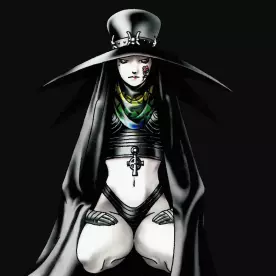
Just as capitalist states are “authoritarian” against working class interests, socialist states are “authoritarian” against capitalist interests.
The state is a tool for one class to oppress another. The goal of (most) communists is to transition from capitalism — where the capitalist class is in power — to a stateless, classless communist society via socialism — where the working class is in power.
Public perception of which is more “authoritarian” therefore depends on which class is currently in power and is able to manufacture consent, and that is the capitalist class in the vast majority of the world right now since the USSR’s overthrow.

socialist states are “authoritarian” against capitalist interests
The problem with this claim is that the USSR was quite authoritarian towards everyone. The Gulags were a place merely of political repression. Political jokes that are part and parcel of American late night comedy shows would get people harsh labor sentences during certain periods. The claim that this had to happen to protect the working class seems thin.

One regime’s political-dissident-by-speech is another’s dissident-by-drug-addiction. America’s “War on Drugs” was purely political disenfranchisement along racial lines, and it’s a major reason why the US continues to have higher incarceration rates than the USSR had in many of the years the Gulag system was operational.
By the way, prison rape jokes have long been a part of those late night comedy shows, to give you an idea of just how ingrained the American prison culture is.

read the resent news of Julian Assange or John Pilger there’d be a lot more if i could think to name them


A five minute primer on Herman & Chomsky’s propaganda model:
Noam Chomsky - The 5 Filters of the Mass Media Machine



With the USSR overthrown, virtually all mainstream media now is capitalist propaganda. And the capitalist class obviously would not want the working class to prefer a system where workers are in power.

I’d also expect there’s more and more people propagandized by capitalist media in post-Soviet states as time has passed since capitalist bastards took it over. People who have not lived under socialism or experienced the massively decreased quality of life from the privatization forced on those countries.
Though fortunately it seems like the Russian capitalists have not managed to succeed in this, with more and more people identifying with the USSR than the capitalist Russian Federation in recent years.
Hard to do that at the heart of the revolution I guess. Maybe Russian communist parties could use that to become more revolutionary, specially with Russians able to see the stark difference between Russia under capitalism and China thriving under socialism. Doubt that’ll happen while Putin is in power though.

Hungarian here. There reason for being the top 1 was because the country was running on debt hell for 10-15 years.
Kádár (the ruler of that time) had promised from 1956 that he will improve the living standards. This worked until the 70s, when the oil crisis happened and Kádár realized that with those current living conditions, the country needs to get loans. So he did that until communism have ended.

Isn’t that generally said by countries that oppose them?
The land of the less authoritarian had race discrimination until half a century ago, right? Seeing the BLM, it seems to have a prominent role even now. So are they any better?

Most large-scale attempts at communism were managed in a centralized way top-down by force. One strong leader, usually with a cult of personality. Glorification of the military. Devaluation of individual life and emphasis on sacrifice for the common good. Suppression of dissent by violence.
You can see the parallels with fascism. I’d even argue that what we know as communism and fascism mainly differ in their approach to the economy.
On the other hand, capitalism exists and thrives in chaos. It doesn’t exclude authoritarianism - actually it tends to produce it when capitalists capture the government. But some capitalist countries manage not to slide all the way and have been keeping up some kind of freedom for decades, so it kinda works.

Ah yes, the legendary capitalist freedom to go homeless and die of preventable diseases. And the awful authoritarian communism of providing full employment and eliminating poverty.
If you don’t think the USA is the most authoritarian country ever, your definition of authoritarianism is useless.

This. This post right here is why no one takes this place seriously.

That chart is pretty great, because it shows that only a tiny minority of US states have smaller incarceration rates than Russia.

Oh yeah, the whole blue state red state thing is just degrees of awful.

I’m not going to stick up for the U.S. carceral system, but it does not really speak unequivocally to the matter at hand now does it?

Let me guess, you’re an American who has never been outside of the USA, never read anything about other countries, and believes 'Murica is the greatest one forever and only one that matters (even in evil)

Yeah, the legendary communist free world, where you went to gulag, if you dared to think of your own. And the awful authoritarian capitalists of bringing up the average quality of life that much since ww2. /S
Sorry, but this view is very much too simple.

What country has the biggest prison population both by raw numbers and on a per capital basis?

By raw numbers obviously the US, followed by china with not too many less. Per capita El Salvador and Cuba are on the first two places. So what’s your point? Per Capita and in raw numbers there is a capitalist country and a country which calls itself socialist on place one and two.
https://en.m.wikipedia.org/wiki/List_of_countries_by_incarceration_rate
Better check your facts before next time.

Now include Guam and Puerto Rico, which are US territories.

? I really don’t know what you are hinting at. In raw numbers the US will still be number 1 followed by China and per capita adding in countries with a lower incarceration rate and less people than the USA won’t lift up the USA in the ranking.

Perhaps, if NATOpedia’s raw data is to be trusted.
Incarceration rates and counts. From World Prison Brief
The World Prison Brief at PrisonStudies.org is an online database providing free access to information on prison systems around the world. It is now hosted by the Institute For Crime & Justice Policy Research (ICPR), Birkbeck College, University of London.
It was previously hosted by the International Centre for Prison Studies (ICPS). It was a research centre at the University of Essex. It was launched at the House of Lords on 4 April 2011. Between 1997 and 2010 ICPS was based in King’s College London and was launched formally by Home Secretary Jack Straw in October 1997. In July 2010 the International Centre for Prison Studies incorporated and registered as a charity with the Charities Commission of England and Wales. From the outset the Centre was independent of governmental and intergovernmental agencies, although it would work closely with them.
So who really knows what the quality of the data is without further investigation. But it seems to have been originally created by the UK’s military-intelligence-industrial complex.

I flubbed one stat that doesn’t really move the needle on the point I was trying to make. I was thinking of world powers and didn’t double check to make sure nations scorned by empire didn’t barely hedge the US out of the top 5 on per capita (though another of its territories made it).
America is a remarkably “authoritarian” country by all standards whether they be prisons, police spending, or military spending.

You know absolutely jack shit about how Lenin came to power, or what Stalin did to maintain it do you?
Communism sounds great on paper and if anyone ever works it out successfully irl I am in.
The problem is they always try to use power to achieve their goals and that corrupts a society from the beginning.
Grown organically it might work but for some reason people really hate communists

Lenin is great, and Stalin literally saved the world. The USSR was a great success. It was as authoritarian as any western “democracy”. Prove me wrong bozo.

How did they go about it though?
At the barrel of a gun.
The same way they kept it going.
Discuss what they achieved all you want, you can be a great man without being a good one.

Damn revolution bad? I guess we should just lie down and accept how things are then. Better the death of millions of people, billions very soon, from the system that exists; than thousands from a revolution. You are very wise.

Have all of the revolutions you want, just don’t force others to live by your choices.
If you have the support, then good.
If not, go start your own thing.
Buy some land and start a community, support each other and grow larger through shared experiences and work.
If you get enough, you can start your own town.
Yeah you kind of still have to play by other rules as far as taxes, but you could be self-sufficient and off the grid.
Residential windmills and solar panels have come a long way, recycling would be easier, and if you get the right machine, you can actually burn trash for power.
Move in more people like yourself and you can probably go big enough to take over a county by sheer weight of legitimacy.
That’s probably as big as you could go though, the Mormons have kind of got Utah, but they’ve been working on that since like the 1850’s I think, and they still only have influence, a rather large amount of influence, but not control

You can see the parallels with fascism.
Totalitarianism, AKA authoritarianism. Hannah Arendt came from wealth and so unsurprisingly was anticommunist. Her work was financially supported and promoted by the CIA. This is a bourgeois liberal, intentionally anticommunist construct that lumps fascism and communism in the same bucket.
Monthly Review, The CIA and the Cultural Cold War Revisited
U.S. and European anticommunist publications receiving direct or indirect funding included Partisan Review, Kenyon Review, New Leader, Encounter and many others. Among the intellectuals who were funded and promoted by the CIA were Irving Kristol, Melvin Lasky, Isaiah Berlin, Stephen Spender, Sidney Hook, Daniel Bell, Dwight MacDonald, Robert Lowell, Hannah Arendt, Mary McCarthy, and numerous others in the United States and Europe. In Europe, the CIA was particularly interested in and promoted the “Democratic Left” and ex-leftists, including Ignacio Silone, Stephen Spender, Arthur Koestler, Raymond Aron, Anthony Crosland, Michael Josselson, and George Orwell.
If fact almost all of the “Western left” (that wasn’t crushed by red scares) was captured by the imperial core’s propaganda machine: Imperialist Propaganda and the Ideology of the Western Left Intelligentsia: From Anticommunism and Identity Politics to Democratic Illusions and Fascism

Because of who controls the presses in capitalist countries.

From Losurdo - A critique of the category of totalitarianism:
Nowadays we constantly hear denunciations, directed toward Islam, of ‘religious totalitarianism’ or of the ‘new totalitarian enemy that is terrorism’. The language of the Cold War has reappeared with renewed vitality, as confirmed by the warning that American Senator Joseph Lieberman has issued to Saudi Arabia: beware the seduction of Islamic totalitarianism, and do not let a ‘theological iron curtain’ separate you from the Western world.
Even though the target has changed, the denunciation of totalitarianism continues to function with perfect efficiency as an ideology of war against the enemies of the Western world. And this ideology justifies the violation of the Geneva Convention, the inhuman treatment of prisoners in Guantanamo Bay, the embargo and collective punishment inflicted upon the Iraqis and other peoples, and the further torment perpetrated against the Palestinians. The struggle against totalitarianism serves to legitimate and transfigure the total war against the ‘barbarians’ who are alien to the Western world.

From a Swedish standpoint, this is just nonsense. The Nordic countries (Sweden, Norway, Finland, Island and Denmark) are all in the top six most democratic countries in the world (according to The economist, England). These are were much socialist countries and most definitely democratic.
Then you have china, soviet and alike. Those are countries that call(ed) themself communist. I will argue that that’s however mostly used as a label to legitimate the government and to obscure what they really are, in the same manner north Korea is formaly named the democratic people’s republic of Korea (DPRK). Those countries does/did not operate as communist states the way that Marx and other political theorists imaginend them.

I’d like to add that the nordic countries are not socialist by any metric.
Also, we shouldn’t be so quick to trust western media on the DPRK, who have gotten to the point that they can literally say anything about their enemies, and have it be believed.
- Is north korea a totalitarian dictatorship? Are they all really required to get the same haircut? A short documentary.
- Are north korean defectors really paid to lie by the south? A short documentary.
- What is everyday life like? A conversation with a North Korean Citizen.
- South Korea boosts reward for defectors to $860k USD.

They Nordic countries type of socialism may not be a replacement for capitalism (I live in Sweden so I’d know) but works alot more like the type of socialism that’s common in Europe.
This terminology might not be on spot but I still think the Nordic countries are what most people would refere to as at least a little bit socialist. Maybe the proper term is social democratic?

The proper term is social democratic. Socialism has a simple and specific definition. Those Nordic countries have changed nothing about who owns the means of production and therefore have no relation to socialism.

The Nordic countries are at best welfare capitalist states, and that welfare relies on the super-exploitation of the Global South. No Nordic country is even gesturing toward the abolition of private ownership of the means of production. In fact they’re moving in the opposite direction, toward the neoliberal privatization of more and more of the commons and the financialization of everything, which is burying the working class in debt. The Eurozone is just the cartel of the European private banks, and it was designed to enforce neoclassical economics and preclude Keynsian economics.

The Democracy Index published by the Economist Group
Neoliberal corporate media are defining what is to be considered “democratic”? You don’t have to drink this Kool-Aid.

Yes i know it’s not perfect and the exact positions might not be completely accurate but I still think the overall picture it paints it useful. Maybe we aren’t the most democratic countries but we’re defently democratic. You can check this whit whatever source you happen to prefere

-
What do you believe Marx envisioned a country building Communism to work like?
-
Why are you calling Social Safety Nets “Socialism?”
-

Wew lad but can you ever tell this is .ml.
So, thought experiment for you. What do you need to overthrow a government and oust a bunch of rich assholes from power? Well, you need power of your own, right? You need loyal comrades.
And say you actually manage it. Chances are it was tough. Some didn’t make it. But now you’re sitting on all this wealth and power. Are you just going to give it back? To who? What if someone abuses it?
You’re the one who did the work. You’re the one with a vision for the future. And now you have these loyal comrades and surely they deserve something for their sacrifices and hard work?
And so it goes.
Anyway, it’s less about Communism as a set of ideas and more about what power does to revolutionaries and how that mixes with the local culture.
Or the CIA made it all up because Mao and Stalin et al did nothing wrong. 🙄

Or the CIA made it all up because Mao and Stalin et al did nothing wrong. 🙄
They made mistakes. But overall their countries were a gazillion times better from their influence.

I’ve never seen it put so well. But yeah, it’s super hard for anything nice to actually follow a revolution without outside support.
And there is always outside influence too. That outside influence might make even the best of socialist experiments fail because of embargoes and assassinations. Or maybe the outside influence wants the socialism to succeed, but maybe it has to be their brand of socialism, or else.

Because mass media, manufactured consent, and regulatory capture are the “good” kind of coercion.

I see a lot of comments saying they aren’t. I’d disagree, but I agree they don’t have to be. The issue is most of the major powers in the world have opposed leftist governments anytime they show up. The ones that didn’t have a strong central power and cultural hegymony collapsed under the pressure. Any nation that had a weaker central power was either destroyed, couped, or undermined by the west.
There is nothing intrinsically authoritarian about leftism (really, I’d say it’s less authoritarian in it’s ideals), but authoritarianism is easier to hold together when outside pressures are trying to destroy you.

Because our bourgeois state propaganda and corporate media tell us that they are, because it’s in their best interest that we believe it.


some people have to be forced into being a part of a social system.
IE, there are people who would rather let others die in the streets than have their taxes raised. some people are just terrible human beings who believe ‘i got mine, fuck everyone else’ which is antithetical to socialism, and requires a heavy hand via regulation.

Because communism doesn’t work for large, heterogenous groups, so increasing amounts of coercion are used to keep the system running.
And new forms of government such as socialism are generally more succeptible to corruption as people find the new loopholes; as a government gets more corrupt, those who corrupted it seek to consolidate their power.
I think socialism can be made workable, as we examine and correct the problems with previous attempts. I don’t think communism works well for human societies, as it requires people to act better than we know they do.

I’d argue that no system truly works for larger groups.
more susceptible to corruption
I couldn’t disagree more. Any system is very susceptible to corruption. It’s all about accountability and transparency, which those in power will never make themselves do, because it is actively harming them by stripping them of opportunities to amass more power and influence.
And that is true in any system. Communist states became totalitarian dictatorships, while Capitalist nations also grow more corrupt because of greed and power lust, to the point where you see things like “the revolving door” in the USA, or the Tory party donors essentially paying for peerages in the UK. And of course, there’s also lobbying.
Corruption is everywhere and the common man gets screwed over regardless of the system or people in charge, because the good people are always too good to compete, fight, and play dirty against these politicians so the winners are always the evil ones.

That’s not only an incredibly nihilistic way of seeing the world, but also it is exactly what the bourgeoise dictatorships want you to see: “everything is terrible but the dreaded others are worse, now shut up and work for my 10th yacht”

That’s not what I said. I said everywhere is terrible.
And to be honest, yes, other places have it worse. I used to live in arguably the worst nation in Eastern Europe and I like in the UK now. I sure as hell know which one gibes me more life opportunities, higher quality and diversity of jobs, better education and higher quality of life.
And that’s without even considering the places that are at war.
So yes, people in other places have it much much worse.
Now in terms of nihilism, I actually see myself as more of an absurdist, as ultimately I’ll carry on living in this meaningless universe in spite of its lack of meaning and I will achieve a level of success and satisfaction with my own achievements, (hell, I kinda already have) in spite of the aforementioned
bastardspoliticians.

Oh I completely agree.
Established systems, at least ones that last, tend to have checks on corruption or on consolidating power. These are not always effective, obviously, and corruption is always a danger. My critique was specifically how newer systems have new and unforseen avenues do these antisocial activities.

Because they are. They are all very bad at social justice, probably because no matter the best intentions, humans are going to fuck it up. China isn’t even communist, it’s capitalist through and through. They have lousy worker protections, banks, housing markets, stock markets. The USSR was as expansionist and militaristic as any fascist regime, just like the current Russian one. Korea is essentially a tyrannical monarchy, no real communism to be found there. Why do you think the first ones to go up against the wall after a revolution are the true believers? Because they know it’s all gone wrong.
When you have a lot of bullets, you will never run out of targets. Or in other words, if your revolution involves killing a lot of people in the name of the people, you’re doing it wrong.
Edit: added another post that should go here, deleted the other one.

“All animals are equal but some animals are more equal than others”
